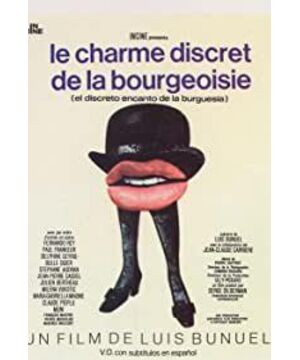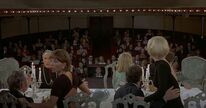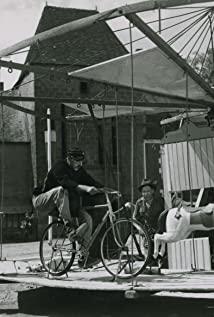In his later years, Buñuel basically lost all his hearing and became a deaf who could only hear his own memories.
He stubbornly photographed the conservative and staid middle class in his films, or retrospectively traced the European high society of the early 20th century until 1972's Discreet Charm of the Bourgeoisie.
The Beatles and bell-bottoms were all the rage at that time, and jazz became faded gold, not to mention graceful and elegant classical music.
Buñuel, however, still likes to show bourgeois style in his films, smug in red tape, sipping martinis and slick suits and tuxedos.
However, Buñuel has never been serious, and he did not intend to tell a good history of the decline and fall of the bourgeois conservatives.
He always used farce and surreal means to deal with these decent middle-aged men and women, so that many people felt that "The Discreet Charm of the Bourgeoisie" was a spicy satire of the bourgeoisie, and they praised the former The surrealist hero worships him for not forgetting his ambition 40 years ago.
I always feel that the phrase "Lian Po is old, can he still eat?" is not enough to describe this film master.
Although there is no shortage of pungent satires in the film, such as the couple who have sex in the grass, they judge others' social status and status according to their clothes. When the priest is dressed as a gardener, they are swept out of the house involuntarily; After the priest entered the door wearing the bishop's clothes, they were very sorry and even showed their respect everywhere.
And this bishop is also a man of two faces. When a dying old man confesses to him, he learns that the old man was the one who killed his parents decades ago. During the ceremony, he did not lose any Christian etiquette, and he told the old man that God would forgive his sins.
However, when he was about to leave, he shot the old man's head directly with a gun.
But these seemingly fake actions are a cunning kindness of Buñuel. He is reluctant to say some high-sounding and serious words, just like when "The Discreet Charm of the Bourgeoisie" was nominated for the Oscar for Best Foreign Language Film, he quickly joked to reporters: "Of course, I pay $25,000 from Oscar!"
Although the film finally won an award, the joke still caused a lot of trouble.
This old man who is in his twilight hopes to paint those familiar old friends of the bourgeoisie one by one to soothe the "prudent charm" that may be regarded as an old antique. This "prudential" temperament is also possessed by Buñuel himself. In the interview with the outside world, he also said without hesitation: "I am also a bourgeoisie!"
Therefore, in the movie, Buñuel used his life experience and the stories of his friends around him as the subject matter.
For example, the soldier suddenly walked up to the three heroines in the restaurant, asked them if they were happy in childhood, and told about his unfortunate experience. This section is actually what Buñuel often wanted to do in bars but didn't do.
The dinner event that the whole film has been revolving around is directly derived from the story of one of Buñuel's friends, Bershman, who encountered in his life, and this story later became the beginning of the film.
But using a dinner or party as an opportunity to let the three men and three women keep chatting, socializing, having sex, cheating, and even walking aimlessly on the country road, Buñuel still didn't intend to let his screen role go easily.
He asked the six people to keep arranging dinner parties, but just as they started to eat, a series of incidents followed. Either the date was wrong, the funeral was being held next to the restaurant, the hostess and the hostess were busy making out and missed the party, or the military drills disrupted the dinner.
But when they were about to have a good meal, they found that they were not only in the dream, but were also interrupted by various means in the dream.
Buñuel could cunningly arrange countless setbacks, allowing these seemingly respectable and noble bourgeois men and women to stumble into an endless quagmire.
And he arranged most of these frustrations in everyone's dreams, and it was still a dream within a dream. For example, the last dream in the film is a dream made by the ambassador of Miranda. In his dream, there are two more scenes of a dinner party, however, one is destroyed by the police and the other is destroyed by the youth terrorists.
During these two dinners, he also had a terrifying dream of a policeman in his dreams, and when the policeman was receiving orders from his superiors, the conversation was completely covered up because of the roar of the plane.
This kind of scene where dreams and key information are "coincidentally" covered up appears many times in the film. Buñuel no longer uses surreal pictures to doubt reality and resist like in "An Andalusian Dog" and "Golden Age". Secular, but the surreal means are incorporated into the plot, scenes and stories of the entire film.
Although this radical blurring of reality and dreams had already begun in 1967's "Beauty in the Daytime", it was not until "The Discreet Charm of the Bourgeoisie" that Buñuel began to use large-scale dreams as a Supplement to a true story, what is a dream? Which is true? Under his cunning, it was already indistinguishable.
As he himself said: "Because dreams are an extension of reality, an extension of the waking state. In movies, once you say 'this is a dream,' they become worthless."
So, every time you attend a dinner party with hunger, and every time your dream is interrupted, it becomes the status quo of the bourgeoisie - they always live in a situation of leisure but full of frustration.
The more advanced the film, the more Buñuel instills subconscious identities into the film, including his cunning benevolence to the bourgeoisie. He lived in a standard bourgeois family since he was a child. Because his father became rich in business in Cuba, after returning to his hometown in Spain, he purchased a large amount of land and became a squire.
When he was young, he could use his blood and romantic passion to rebel against his bourgeois family background and Catholic cultural factors, but in his later years, this anti-bone figure became gentler.
"The Discreet Charm of the Bourgeoisie" is precisely this "dream analysis" from sharp to gentle. Its characters naturally cannot escape the primitive desires of human beings. In order to satisfy their whimsical sexual desires, the Saneshals prefer to let a group of guests sit on the bench; Ambassador Raphael is having an affair with a friend's wife, and when a friend can clearly expose When their adultery, the three chose a decent solution, unwilling to expose the embarrassing facts.
However, these very pitiful desires, like the gathering of six people, are always difficult to be completely satisfied. The sexual affairs of the Saneshals and his wife have been careless; and the affair between Raphael and his friend's wife is helpless to be interrupted.
This atmosphere of unsatisfactory desire and embarrassment turned into a group walk in the scorching sun and far away, they were well-dressed, but they were in a wild place.
Forty years later, Buñuel begins to somehow make peace with himself and his class.
This seemingly conservative and dull deaf old man may have heard something from his various countries such as Spain, France, the United States and Mexico after seventy years of ups and downs. For most of us with good hearing, we may not hear for the rest of our lives.
View more about The Discreet Charm of the Bourgeoisie reviews










